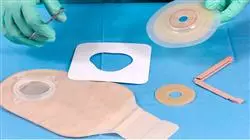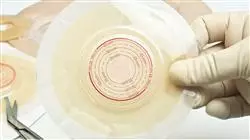University certificate
The world's largest faculty of nursing”
Introduction to the Program
A comprehensive expert designed to propel nurses toward excellence in the care of digestive, feeding, bowel and urinary ostomies"

A reminder of the anatomical and physiological aspects of the digestive system will be made, in order to know its functions, its parts and its importance in the patient's health.
It will be able to identify which diseases or pathological health processes will lead to the performance of digestive feeding ostomies.
An exhaustive classification of the types of digestive feeding ostomies, their functionalities and temporality, as well as the characteristics that identify them, will be carried out.
Unfortunately, complications can occur in digestive feeding ostomies, so knowing, identifying, preventing and treating them is one of the most important roles that nurses will play in their daily work.
Identifying the techniques and ways of feeding patients with these ostomies is key to know what care is required and what needs must be met, and knowing them will prevent complications and unnecessary adverse events.
Nursing care must be planned, so, thanks to this, we will know what care is required by patients with digestive feeding ostomies at each moment.
There are many types of devices for patient care, knowing them, knowing their functions, their peculiarities is essential to be able to treat the patient. Not all devices are the same and not all patients are the same; each patient requires a different device, which will depend on their characteristics, needs and abilities.
Irrigation is one of the techniques that patients can perform in these types of ostomies, so knowing the technique and its peculiarities is necessary to carry out health education with the patient.
The prevention of urinary tract infections is one of the key points in healthcare, due to the morbimortality that this entails, so taking measures to prevent them and carrying out health education for the patient about them is a basic point in our day-to-day work.
You will learn in a real way, through cases and practical situations, which will allow you to deepen your knowledge in a contextual way"
This Postgraduate diploma in Digestive Feeding, Intestinal and Urinary Ostomies for Nurses contains the most complete and up to date scientific program on the market. The most important features of the Specialist Diploma program are:
- Clinical cases presented by experts. Its graphic, schematic and eminently practical contents, with which they are conceived, gather scientific and assistance information on those medical disciplines that are essential for professional practice
- Diagnostic and therapeutic novelties on the care of patients with digestive pathologies
- Presentation of practical workshops on procedures, diagnosis, and treatment techniques
- Algorithm-based interactive learning system for decision-making in the presented clinical situations
- It includes theoretical lessons, questions to the expert, discussion forums on controversial topics and individual reflection papers
- Content that is accessible from any fixed or portable device with an Internet connection
An exceptional opportunity to give your CV a boost with intensive and efficient training, but fully compatible with your professional and personal life"
Its teaching staff includes reference professionals, who contribute their work experience to this refresher program, in addition to other professionals specializing in the digestive system service.
The multimedia content developed with the latest educational technology will provide the professional with situated and contextual learning, i.e., a simulated environment that will provide an immersive training program to train in real situations.
The design of this program is based on Problem-Based Learning, by means of which the nursing professional must try to solve the different professional practice situations that arise throughout the program. This will be done with the help of an innovative interactive video system developed by recognized experts in nursing care in internal digestive pathology care and with extensive teaching experience.

During the course you will acquire practical experience through simulated learning environments based on real situations and cases."
Why study at TECH?
TECH is the world’s largest online university. With an impressive catalog of more than 14,000 university programs available in 11 languages, it is positioned as a leader in employability, with a 99% job placement rate. In addition, it relies on an enormous faculty of more than 6,000 professors of the highest international renown.

Study at the world's largest online university and guarantee your professional success. The future starts at TECH”
The world’s best online university according to FORBES
The prestigious Forbes magazine, specialized in business and finance, has highlighted TECH as “the world's best online university” This is what they have recently stated in an article in their digital edition in which they echo the success story of this institution, “thanks to the academic offer it provides, the selection of its teaching staff, and an innovative learning method aimed at educating the professionals of the future”
A revolutionary study method, a cutting-edge faculty and a practical focus: the key to TECH's success.
The most complete study plans on the university scene
TECH offers the most complete study plans on the university scene, with syllabuses that cover fundamental concepts and, at the same time, the main scientific advances in their specific scientific areas. In addition, these programs are continuously being updated to guarantee students the academic vanguard and the most in-demand professional skills. In this way, the university's qualifications provide its graduates with a significant advantage to propel their careers to success.
TECH offers the most comprehensive and intensive study plans on the current university scene.
A world-class teaching staff
TECH's teaching staff is made up of more than 6,000 professors with the highest international recognition. Professors, researchers and top executives of multinational companies, including Isaiah Covington, performance coach of the Boston Celtics; Magda Romanska, principal investigator at Harvard MetaLAB; Ignacio Wistumba, chairman of the department of translational molecular pathology at MD Anderson Cancer Center; and D.W. Pine, creative director of TIME magazine, among others.
Internationally renowned experts, specialized in different branches of Health, Technology, Communication and Business, form part of the TECH faculty.
A unique learning method
TECH is the first university to use Relearning in all its programs. It is the best online learning methodology, accredited with international teaching quality certifications, provided by prestigious educational agencies. In addition, this disruptive educational model is complemented with the “Case Method”, thereby setting up a unique online teaching strategy. Innovative teaching resources are also implemented, including detailed videos, infographics and interactive summaries.
TECH combines Relearning and the Case Method in all its university programs to guarantee excellent theoretical and practical learning, studying whenever and wherever you want.
The world's largest online university
TECH is the world’s largest online university. We are the largest educational institution, with the best and widest online educational catalog, one hundred percent online and covering the vast majority of areas of knowledge. We offer a large selection of our own degrees and accredited online undergraduate and postgraduate degrees. In total, more than 14,000 university degrees, in eleven different languages, make us the largest educational largest in the world.
TECH has the world's most extensive catalog of academic and official programs, available in more than 11 languages.
Google Premier Partner
The American technology giant has awarded TECH the Google Google Premier Partner badge. This award, which is only available to 3% of the world's companies, highlights the efficient, flexible and tailored experience that this university provides to students. The recognition as a Google Premier Partner not only accredits the maximum rigor, performance and investment in TECH's digital infrastructures, but also places this university as one of the world's leading technology companies.
Google has positioned TECH in the top 3% of the world's most important technology companies by awarding it its Google Premier Partner badge.
The official online university of the NBA
TECH is the official online university of the NBA. Thanks to our agreement with the biggest league in basketball, we offer our students exclusive university programs, as well as a wide variety of educational resources focused on the business of the league and other areas of the sports industry. Each program is made up of a uniquely designed syllabus and features exceptional guest hosts: professionals with a distinguished sports background who will offer their expertise on the most relevant topics.
TECH has been selected by the NBA, the world's top basketball league, as its official online university.
The top-rated university by its students
Students have positioned TECH as the world's top-rated university on the main review websites, with a highest rating of 4.9 out of 5, obtained from more than 1,000 reviews. These results consolidate TECH as the benchmark university institution at an international level, reflecting the excellence and positive impact of its educational model.” reflecting the excellence and positive impact of its educational model.”
TECH is the world’s top-rated university by its students.
Leaders in employability
TECH has managed to become the leading university in employability. 99% of its students obtain jobs in the academic field they have studied, within one year of completing any of the university's programs. A similar number achieve immediate career enhancement. All this thanks to a study methodology that bases its effectiveness on the acquisition of practical skills, which are absolutely necessary for professional development.
99% of TECH graduates find a job within a year of completing their studies.
Postgraduate Diploma in Digestive, Intestinal, Feeding and Urinary Ostomies for Nursing.
Ostomies are artificial openings made in the body through the abdomen to aid in the elimination of waste, fluids or gas. Digestive feeding, bowel and urinary ostomies are the most common.
Feeding digestive ostomies are performed when part of the digestive tract is not functioning properly and nutrition needs to be provided through a route other than the mouth. In these cases, an opening is created in the stomach or small intestine to allow for the insertion of a feeding tube.
Intestinal ostomies are done when fecal matter must be diverted to prevent obstruction of the colon or to allow recovery after surgery. In these cases, an opening is created in the abdomen to allow waste to pass through an external or internal collection bag.
Urinary ostomies are performed when urine cannot be eliminated through the urethra due to illness or injury. These ostomies are usually performed through a urinary diversion, which connects the ureters to an external collecting bag.
Get trained in Digestive Feeding, Bowel and Urinary Ostomies with this program for Nursing.
Nursing professionals who work with patients who have digestive feeding, bowel or urinary ostomies have a wide variety of vital roles. Among the tasks they may perform are monitoring ostomy placement and discharge or drainage patterns, care and maintenance of the collection device, teaching patient and family self-care, assessing nutritional status, monitoring signs and symptoms of complications, administering medications, and following the plan of care.
TECH the world's largest digital university has this specialized academic program designed to train professionals in the care and management of different types of ostomies, including feeding digestive, bowel and urinary ostomies.







